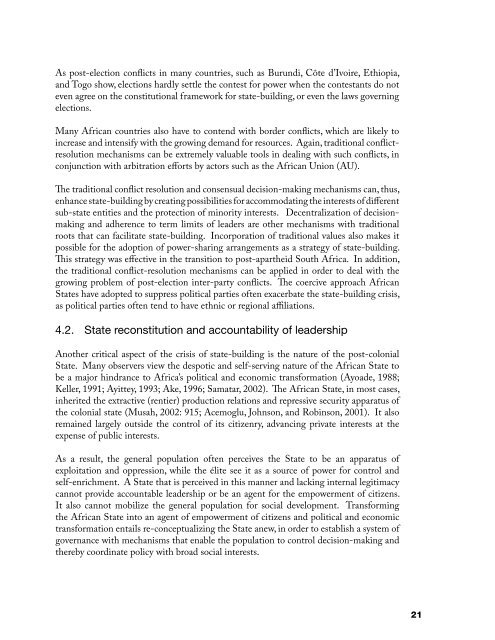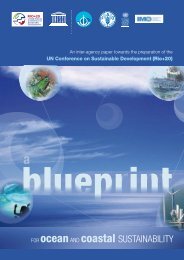Relevance of - United Nations Economic Commission for Africa
Relevance of - United Nations Economic Commission for Africa
Relevance of - United Nations Economic Commission for Africa
You also want an ePaper? Increase the reach of your titles
YUMPU automatically turns print PDFs into web optimized ePapers that Google loves.
As post-election conflicts in many countries, such as Burundi, Côte d’Ivoire, Ethiopia,<br />
and Togo show, elections hardly settle the contest <strong>for</strong> power when the contestants do not<br />
even agree on the constitutional framework <strong>for</strong> state-building, or even the laws governing<br />
elections.<br />
Many <strong>Africa</strong>n countries also have to contend with border conflicts, which are likely to<br />
increase and intensify with the growing demand <strong>for</strong> resources. Again, traditional conflictresolution<br />
mechanisms can be extremely valuable tools in dealing with such conflicts, in<br />
conjunction with arbitration ef<strong>for</strong>ts by actors such as the <strong>Africa</strong>n Union (AU).<br />
The traditional conflict resolution and consensual decision-making mechanisms can, thus,<br />
enhance state-building by creating possibilities <strong>for</strong> accommodating the interests <strong>of</strong> different<br />
sub-state entities and the protection <strong>of</strong> minority interests. Decentralization <strong>of</strong> decisionmaking<br />
and adherence to term limits <strong>of</strong> leaders are other mechanisms with traditional<br />
roots that can facilitate state-building. Incorporation <strong>of</strong> traditional values also makes it<br />
possible <strong>for</strong> the adoption <strong>of</strong> power-sharing arrangements as a strategy <strong>of</strong> state-building.<br />
This strategy was effective in the transition to post-apartheid South <strong>Africa</strong>. In addition,<br />
the traditional conflict-resolution mechanisms can be applied in order to deal with the<br />
growing problem <strong>of</strong> post-election inter-party conflicts. The coercive approach <strong>Africa</strong>n<br />
States have adopted to suppress political parties <strong>of</strong>ten exacerbate the state-building crisis,<br />
as political parties <strong>of</strong>ten tend to have ethnic or regional affiliations.<br />
4.2. State reconstitution and accountability <strong>of</strong> leadership<br />
Another critical aspect <strong>of</strong> the crisis <strong>of</strong> state-building is the nature <strong>of</strong> the post-colonial<br />
State. Many observers view the despotic and self-serving nature <strong>of</strong> the <strong>Africa</strong>n State to<br />
be a major hindrance to <strong>Africa</strong>’s political and economic trans<strong>for</strong>mation (Ayoade, 1988;<br />
Keller, 1991; Ayittey, 1993; Ake, 1996; Samatar, 2002). The <strong>Africa</strong>n State, in most cases,<br />
inherited the extractive (rentier) production relations and repressive security apparatus <strong>of</strong><br />
the colonial state (Musah, 2002: 915; Acemoglu, Johnson, and Robinson, 2001). It also<br />
remained largely outside the control <strong>of</strong> its citizenry, advancing private interests at the<br />
expense <strong>of</strong> public interests.<br />
As a result, the general population <strong>of</strong>ten perceives the State to be an apparatus <strong>of</strong><br />
exploitation and oppression, while the élite see it as a source <strong>of</strong> power <strong>for</strong> control and<br />
self-enrichment. A State that is perceived in this manner and lacking internal legitimacy<br />
cannot provide accountable leadership or be an agent <strong>for</strong> the empowerment <strong>of</strong> citizens.<br />
It also cannot mobilize the general population <strong>for</strong> social development. Trans<strong>for</strong>ming<br />
the <strong>Africa</strong>n State into an agent <strong>of</strong> empowerment <strong>of</strong> citizens and political and economic<br />
trans<strong>for</strong>mation entails re-conceptualizing the State anew, in order to establish a system <strong>of</strong><br />
governance with mechanisms that enable the population to control decision-making and<br />
thereby coordinate policy with broad social interests.<br />
21
















